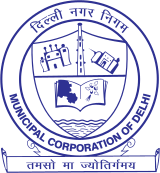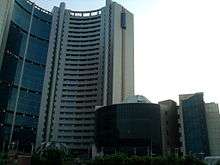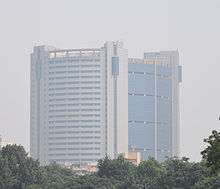Municipal Corporation of Delhi
| Municipal Corporation of Delhi दिल्ली नगर निगम vishesh | |
|---|---|
 | |
| Type | |
| Type |
Local Authority of the Delhi |
| Structure | |
| Seats | 272 (Now trifurcated into North, South and East - North and South civic bodies with 104 members each and the East civic body with 64 members) |
Political groups |
BJP INC BSP |
| Elections | |
Last election | April, 2012 |
| Meeting place | |
| MCD Civic Centre | |
| Website | |
| mcdonline.gov.in | |
The Municipal Corporation of Delhi (MCD) was a municipal corporation, an autonomous body that governs 8 of the 11 Districts of Delhi, in the state of Delhi, India. It was one of three municipal corporations in the National Capital Territory of Delhi, the others being New Delhi Municipal Council, and Delhi Cantonment Board. "The MCD was among the largest municipal bodies in the world providing civic services to more than estimated population of 11 million citizens in the capital city.[1] The municipal corporation covers an area of 1,397.3 km² (539.5 mi²).

"Within its jurisdiction are some of the most densely populated areas in the world. It has also the unique distinction of providing civic services to rural and urban villages, resettlement colonies, regularised unauthorised colonies, Slum/Squatter Settlements, private 'katras' etc."

"MCD came into existence on the 7th of April, 1958 under and Act of Parliament. Prior to that DMC ( Delhi Municipal Committee ) was the principal civic body of Delhi. Eminent Freedom Fighter Guru Radha Kishan has the honour to represent MCD ( initially Delhi Municipal Committee ) for most consecutive years as a Councillor. The first elected Mayor of Delhi was Pt. Trilok Chand Sharma served as First Mayor of Delhi. Since then, the Municipal Body has always been alive in its constitution and functioning to the growing needs of citizens. The 1993 amendment of the Act brought about fundamental changes in composition, functions, governance and administration of the corporation."
MCD zones and employee list
The entire MCD area is divided into 12 zones spread across three smaller municipal corporations:
- North Delhi Municipal Corporation[2]
- South Delhi Municipal Corporation[3]
- East Delhi Municipal Corporation[4]
Amendment
The 73rd and 74th Constitutional Amendments were introduced in 1992 and were meant to facilitate greater decentralization at the rural and urban level respectively. They did so through providing legal status to local assemblies and entrusting them with greater functions and powers. The inclusion of certain social categories that had historically been marginalized from policy making and implementing structures was fundamental to the project of decentralization. These social categories were the Scheduled Castes, Scheduled Tribes and women. While the 73rd Amendment applies to the Panchayati Raj system, the 74th Amendment applies to Municipal Corporations, Municipal Councils and Nagar Panchayats depending on the size of the city. The 74th Amendment states:
“Not less than one – third (including the number of seats reserved for women belonging to the Scheduled Castes and Scheduled Tribes) of the total number of seats to be filled by direct election in every Municipality shall be reserved for women and such seats may be allotted by rotation to different constituencies in a Municipality.
Demographics
As of 2011 India census,[1] Delhi Municipal Corporation (U) had a population of 11,007,835. Males constitute 55% of the population and females 45%. Delhi Municipal Corporation (U) has an average literacy rate of 87.6%, higher than the national average of 74.0%: male literacy is 91.44% and, female literacy is 83.20%. In Delhi Municipal Corporation (U), 13% of the population is under 6 years of age.
Trifurcation
Recently Delhi Municipal corporation has been trifurcated into three smaller Municipal corporations - North Delhi Municipal Corporation, South Delhi Municipal Corporation, East Delhi Municipal Corporation. The Bharatiya Janata Party of India (BJP) won the elections for a third consecutive time. The party has been ruling Delhi's Municipal Corporation for nearly 14 years.
In 2012, Delhi was divided into three zones: North, East, and South. These are the results of the elections in those three parts:
North Delhi
| SN | Party | Seats won |
Seats Changed |
|---|---|---|---|
| 1 | Bharatiya Janata Party | 59 | - |
| 2 | Indian National Congress | 29 | - |
| 3 | Bahujan Samaj Party | 7 | - |
| 4 | Others | 9 | - |
| Total | 104 |
South Delhi
| SN | Party | Seats won |
Seats Changed |
|---|---|---|---|
| 1 | Bharatiya Janata Party | 44 | - |
| 2 | Indian National Congress | 29 | - |
| 3 | Bahujan Samaj Party | 5 | - |
| 4 | Others | 26 | - |
| Total | 104 |
Bharatiya Janata Party (BJP) was not able to get a majority in this zone of Delhi (South Zone) as it needed more than 50% of total votes i.e. they were 10 seats short of it. Therefore, they allied with independent candidates/other parties that had a small proportion of seats to make that number by which it could administer corporation.
East Delhi
| SN | Party | Seats won |
Seats Changed |
|---|---|---|---|
| 1 | Bharatiya Janata Party | 39 | - |
| 2 | Indian National Congress | 19 | - |
| 3 | Bahujan Samaj Party | 3 | - |
| 4 | Others | 0 | - |
| Total | 64 |
References
- 1 2 "Cities having population 1 lakh and above" (PDF). censusindia. The Registrar General & Census Commissioner, India. Retrieved 20 October 2011.
- ↑ "Zonal Structure of NDMC". North Delhi Municipal Corporation. Retrieved 1 May 2015.
- ↑ "Zonal Structure of SDMC". South Delhi Municipal Corporation. Retrieved 1 May 2015.
- ↑ "Zonal Structure of EDMC". East Delhi Municipal Corporation. Retrieved 1 May 2015.
- ↑ BJP storms Town Hall, infighting breaks out in Congress- Hindustan Times